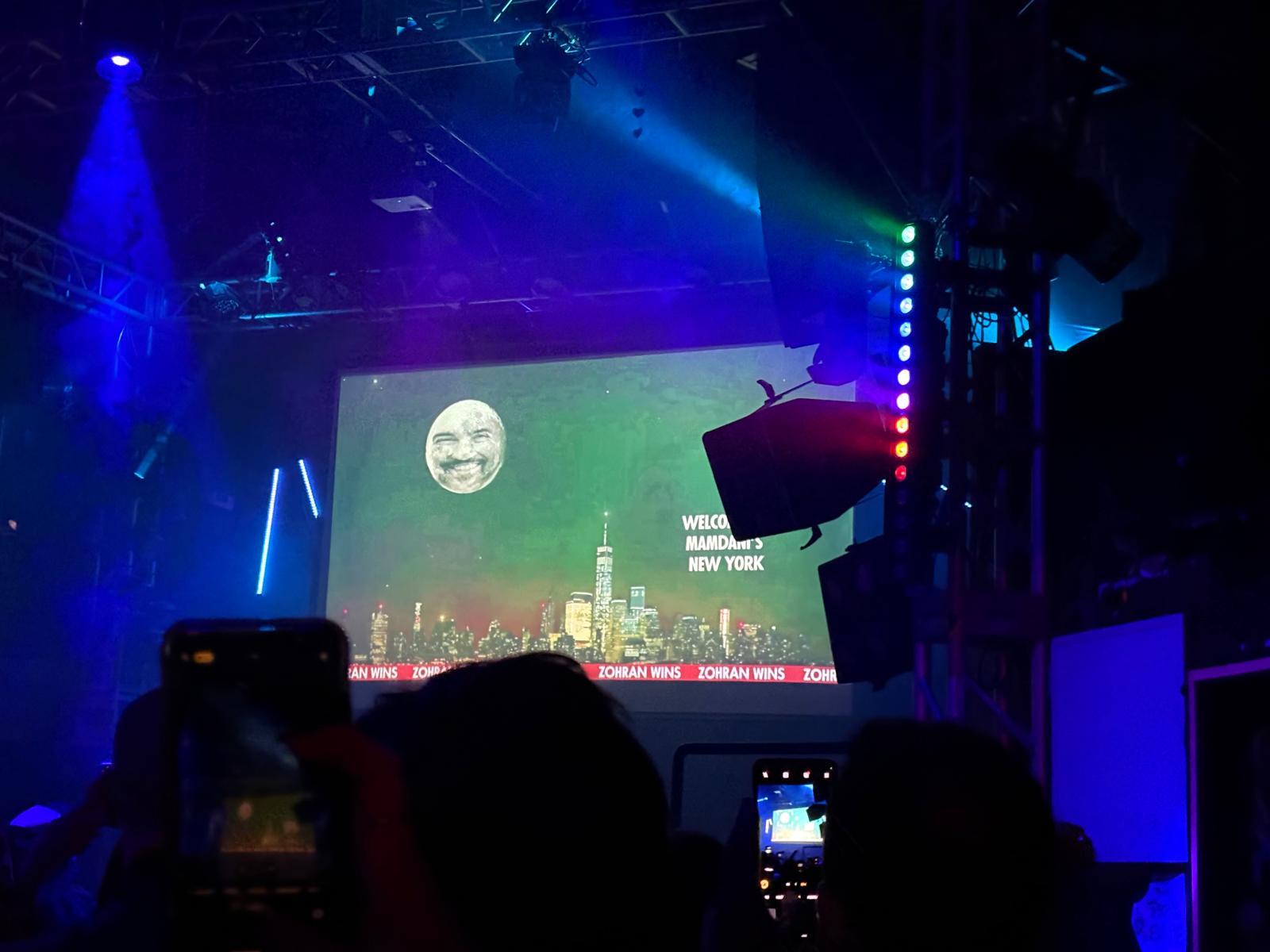What’s a “watch party“? That’s what my friends from Italy ask me on WhatsApp. What do I tell them? That I’m in a mega-club in Brooklyn, and that while I dance, pretending to be twenty-five myself, on a giant screen two hosts talk, make faces, and show comedy sketches that enlivened the latest New York City mayoral campaign.
It’s a live broadcast from Hell Gate, an independent, worker-owned local network named after the first railroad bridge between Queens and the Bronx. This [name], in turn, comes from the name given by the first Dutch explorers to the stretch of the East River that passes beneath it, due to the treacherous currents that flow through it, the dangerous whirlpools, and the sharp rocks. An iconic location in the city that must have inspired the young editorial team to define themselves as follows: “Sharp, playful, indignant, irreverent, and helpful to our readers; deeply skeptical of power but stubbornly idealistic and never a burden to read.” Absolutely perfect as ambassadors for Zohran Mamdani, the city’s new mayor.


At approximately 11:30 PM, Zohran appears live from the Paramount Theater in Downtown Brooklyn. The music stops, and after thunderous applause, silence falls. I don’t recall ever witnessing such a powerful speech in real time. Since last September, I’ve been following Zohran Mamdani through the press and social media; to better understand, I participated in three canvassing groups and half-froze in the stands at Forest Hills Stadium to hear him speak live. Zohran has become a beloved figure. I thought of him: a good man, reassuring and progressive, but also with his feet on the ground. From tonight, Zohran is all that and much more. As Bernie Sanders said at the New York Is Not for Sale rally: “This man will make history.”
A full moon shines in the sky, while on earth, between the bold skyscrapers of Manhattan and the staid brownstones of Brooklyn, a cat has transformed into a tiger. This is how Zohran appeared to me last night, like the victorious mother tiger, still furious because she has just defeated a poacher who wanted to steal her cubs. Tonight, Zohran is no longer the shrewd and conscientious politician who smiles at foolish threats and chooses to respond benevolently to vulgar personal insults; tonight, he is strong and decisive.
He is authoritative in quoting Eugene Debs, a socialist born on November 5, 1855, who denounced the country’s decision to participate in the First World War and was imprisoned for it. Incidentally, New York City has an important and deep-rooted tradition of socialist politics, which by the middle of the last century had made it one of the most advanced and progressive cities on the planet. I cite one of the many good things about that era: university was free. Forty years of unbridled neoliberalism have failed to destroy its soul. As Zohran will say in his speech, this city was built by immigrant labour and today it has an immigrant mayor.
He becomes affable in acknowledging the victory of the people, of the citizens who, tired of suffering, overthrew with the power of the vote a political dynasty accustomed to lies. It’s not true that those whose hands are calloused and chapped by hard work can’t hold political power in those same hands. Of course they can, if an egalitarian and trusting relationship has been established between the parties. This is what Zohran is saying to his voters: to the young people who wisely refused to place their future in the hands of a relic of the old political system like Andrew Cuomo, to the workers, especially to the immigrants, who, instead of giving in to the threats of those accustomed to governing with arrogance, responded courageously by choosing him as their champion against injustice and prejudice.
He shows gratitude even to those who didn’t vote for him and still fear him, and his speech becomes friendly. He tells everyone: “Every day I will work to make this city better than it was the previous day, and for everyone.” In the new NYC, there will be no room for displays of hatred and exclusion. This must apply to Jews, Muslims, Christians, etc., but also to gays, lesbians, and transgender people, single mothers, and aunts. Yes, even aunts. And here I feel personally concerned, being the aunt of four beautiful nieces and nephews. The reference is actually to the new mayor’s aunt, who has become a funny anecdote during the election campaign. Zohran brought her up to explain how hurtful Islamophobia can be. As a teenager, he was very fond of this aunt, a rather independent woman, but one day he saw her coming home upset. She had been insulted on the subway simply because she was wearing a hijab. From that day on, she categorically refused to take the subway.
But Zohran can also be fierce, and he knows when to be so: this victory represents the first day of a new era. And then he stops, looks calmly at the audience, his eyes widening and blazing: “President Trump, I know you’re watching me. So turn up the volume. These next words are directed at you and your millionaire friends. We will no longer allow you to play politics by your rigged rules; you will have to play by everyone’s rules. Here in NYC, the time when you could evade taxes by exploiting loopholes in the system is over.” And shortly after, he adds: “To get to any one of us, you’ll have to get to all of us.”
Irony is perhaps his favourite weapon. He chuckles as he admits: “I am young, despite my efforts to age. I am Muslim. I am a democratic socialist. And, most seriously of all, I refuse to apologize for any of this.” The lesson is important: never be ashamed of who we are.
I want to end this piece on a light note. Not gossip, but something that holds everything together. Starting tonight, the political scene will not only feature a passionate and successful young man; at his side is Rama, not the Indian god, but a beautiful young Syrian woman, his wife.